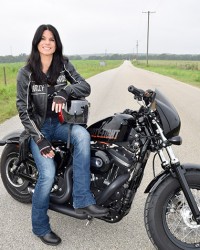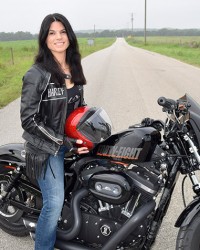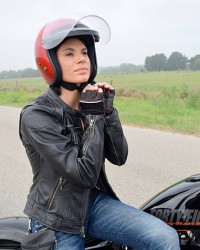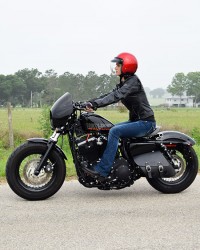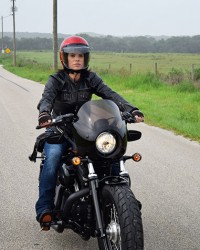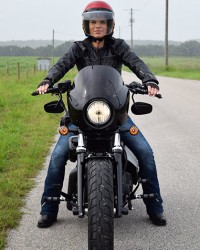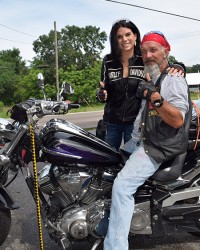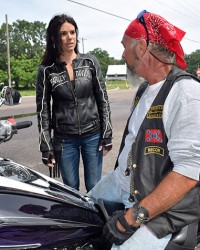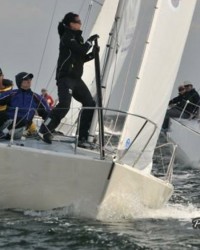Stephanie Karidas, More Than Just A Biker
There is assistance available when someone you know and love has had a traumatic brain injury resulting from a fall, an accident, or physical assault. People who have had an accident may not know what to do or what options they may have in order to treat these issues. Educating the public is very important when it comes to understanding Traumatic Brain Injuries (TBI) and Aphasia.
In this month’s cover story, we are going to introduce you to Stephanie Karidas, Ph.D., CCC-SLP. Stephanie is an accomplished speech-language therapist, sailboat racing competitor, and Harley-loving rider! Stephanie knows just too well what consequences a head injury can have. Stephanie helps those riders and others who suffered a brain injury to rehabilitate their communication and cognitive (thinking) skills. She has met many different clients throughout her career as a speech-language pathologist and has seen the positive long-term benefits of early, but also late intervention. Brain injuries can impact an individual’s ability to think, speak, write, read and drastically impact someone’s quality of life. But not everybody knows what to do after a head injury or stroke. Only a few know how many resources can be utilized to rehabilitate from an acquired brain injury – and this is why we are introducing Doc Steph to you in this month’s cover story!
Stephanie is easily approachable when it comes to helping folks who need help. My conversation with her was fun, enlightening, and educational.
Tell us a little bit more about yourself, your life, and your family! “I grew up in Germany. My family is pretty big, and they have been my major support throughout my life. I left Germany in 2007 after I graduated university to continue my studies at the University of South Florida (USF) in Tampa. I graduated with my second Master’s degree and a Ph.D. in Communication Sciences and Disorders and actually planned on moving up North to pursue a career in Speech Pathology. But, I met my husband about a year before my graduation and decided to stay.”
Tell me about your husband! “Nate and I met at the Davis Island Yacht Club through racing sailboats competitively. We traveled together from one regatta to the next. Nate also introduced me to motorcycles!”
“One day I decided it was time for me to get my own license – after all, riding on the back is only half the fun! At that time, my husband was working on oil rigs in Louisiana and when he came back from one of his trips, I proudly showed him my new ‘two-wheel-independence’ license! We are both very responsible and careful riders and before I rode on the streets, I asked him to continue practicing riding with me, riding in large parking lots. I learned a lot from my riding class but didn’t feel accomplished enough to face the heavy traffic out there. I think it was about two weeks of daily routine activities, such as practicing turns, sudden stops, figure eights, anything you could think of, where I finally felt more comfortable to face the heavy traffic. We started riding on the road and I actually rode his Honda Fury for a pretty long time until I got my own bike, a Sportster 48, 1200cc. She is a pretty one and she can certainly hang with the big boys! I take her to different events, but when it comes to long rides, I still hop on my husband’s Road Glide and just enjoy the ride with him.”
What are signs of a Traumatic Brain Injury (TBI)?
“There are many signs and symptoms that can occur, such as emotional and behavioral changes, cognitive complications which present as problems with memory, learning, making decisions, problem-solving, concentration/attention, reading, and writing, but also speech and language impairments. Aphasia is a language disorder that can occur after a stroke but also through a TBI.”
What is your mission as a therapist?
“My mission is to provide language, speech, and cognitive treatment for individuals suffering from TBI and/or Aphasia. I provide individual sessions, which are offered as standard sessions of about two hours per week or as an intensive package (five or more hours per week). I am an Aphasia and TBI advocate – I want to spread the knowledge! Many people do not know about acquired communication disorders such as Aphasia. The term ‘Aphasia’ is often unknown! TBI is very common and obviously more of a general known medical term than Aphasia. But do you really know what it means to suffer from a TBI on a daily basis? Do you know how the life of a loved one changes after an accident and/or a stroke? And do we know what resources to utilize after a brain injury? The results of a communication and/or cognitive disorder can have major impacts on an individual’s social life, their families, and friends. It can cause social isolation, depression, and emotional distress. Simple tasks that we take for granted are often impaired, such as speaking and understanding, maintaining attention, solving problems, remembering events, names, appointments, organizing and following a daily routine, and interacting socially. But, there is so much more help out there than one might imagine! And that is where I come into play – I support and rehabilitate individuals with TBIs and Aphasia. I teach compensatory strategies for impaired skills, I strengthen skills that remained intact. I consult with the individual’s families and train them how to make adjustments to these immense changes. My goal is to improve and maintain the quality of life after a traumatic incident or stroke through therapy. I urge everyone to think about loved ones in their family or circle of friends who have suffered a brain injury or stroke that may need help. The sooner we start the rehabilitation process, the better the outcomes!”
What are the options for people suffering from a TBI and/or Aphasia? As a Speech-Language Therapist, I provide individual, client-centered therapy that is based on the client’s personal needs and skills. I focus very strongly on functional therapy outcomes to improve the client’s everyday life to help provide a better quality of life. Life changes drastically after experiencing Aphasia and/or TBI, and it is my mission to deliver the most effective treatment to you and consult with your family.”
Stephanie, you mentioned that you also volunteer at a non-profit organization in St. Petersburg! Tell us about that! “Yes, I am volunteering and working for Voices of Hope for Aphasia (VOHA) in St. Petersburg. VOHA was established in 2012 by Mike and Kathy Caputo. Mike suffered from a stroke at the age of 51 years which resulted in Aphasia. Until then, Mike was living a normal life with his family in New Jersey. He was a director and International leader for a large company. His life changed after his stroke; he had to learn how to live with Aphasia. Mike and his wife decided to form an organization to help others with Aphasia. VOHA is a community-based aphasia program for people living with aphasia and their families. They offer several programs, such as a 2-day Workshop, which is designed to educate people with aphasia and their families about different communication strategies and resources available. VOHA also offers group meetings for people with aphasia where members get together to talk about current events, do different and fun activities, discuss interesting topics, and many more things. At these meetings, therapist like myself, lead the groups to provide skilled support for members with Aphasia. These meetings are fun and get people with Aphasia (and other neurogenic disorders) involved in different activities. They are able to socialize with others who are also experiencing a communication disorder and are just ‘getting back to life’ as we say at VOHA. VOHA also offers many more program options which you can access on their website www.vohaphasia.org. I have been with this organization for many years, they are like family to me, and I highly recommend them! You will greatly benefit from joining the many programs offered by VOHA, and I promise that you will meet the most amazing people who will eventually all become your friends.”
One particularly successful story is when Stephanie worked closely with a young teenager who was in a serious car accident and suffered from a severe TBI about two years ago. He is the son of dear, good friends who also ride motorcycles with Stephanie and Nate. Their son was in a long coma and the doctor’s initial prognosis was devastating to his family and friends. But, against all odds, he started progressing and finally came home! Stephanie explained, “I spent 7-9 hours a week with him for about 8 months. I worked with him on metacognitive skills (identifying errors, reflecting on his own performance, applying used strategies independently, etc.), attention, memory, problem solving, reading and language comprehension. Once it was time for him to go back to school, I had meetings with the school officials and therapists to make sure everything was set up correctly for him and his needs (in my area of expertise). I’m still working with him this summer, a few hours a week. He is a fantastic kid who has a great amount of outstanding support and truly unconditional love from his family. His accident was a terrible experience for his family and friends, but he is blessed with very strong and amazing parents who did absolutely everything right and possible during his recovery process.”
Let’s say someone got into a motorcycle accident and a TBI has occurred whereby it has affected speech, language, and cognitive skills. What is the process of getting them the help they may need? “I get involved when he or she is released from the hospital (out-patient rehabilitation) and speech, language and/or cognition skills need to be rehabilitated. The first six months of recovery is an important part of the recovery process; individuals usually notice fast improvements during this spontaneous recovery phase. It is very important to know and understand that progress still occurs after this speedy recovery phase. Recovery can occur even after two years post-injury. Our brain has the ability to ‘rewire’ itself after an injury by forming new neural connections; it can adapt to the changes in its environment which are why therapy is so vital for everyone suffering from a brain injury or stroke. This phenomenon is called Neuroplasticity and it truly has a profound impact on the recovery process.”
What would you like everyone to take away from your story? “Know that therapy is vital during your recovery process. Seek my professional help. Ride with me on the road to recovery and let’s work on this together!”
Thank you, Stephanie, for helping those in the motorcycling community with TBI and sharing your story with the readers of Born To Ride magazine!
Who: Stephanie Karidas, Ph.D., CCC-SLP
What: Bay Area Speech, Language & Cognitive Therapy LLC
Where: 716 S Oakwood Ave, Brandon, FL
Web: www.bayarea-speech.com
Email: office@bayarea-speech.com
Tel: 813-956-9564




